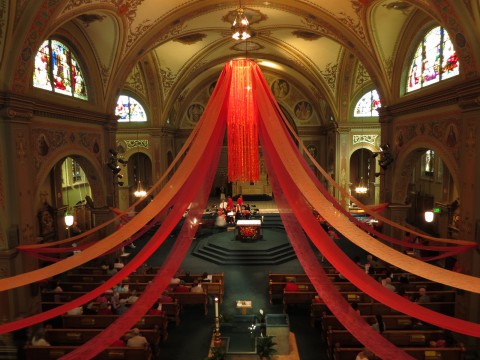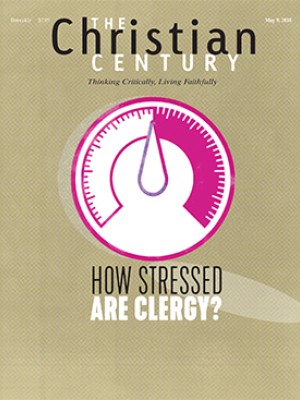We need a Pentecost
Divisions mark our society—and our churches. What could possibly bring us together?
As a child, my favorite story to recite was the narrative of Pentecost in the book of Acts. My love for this narrative was not surprising, as I was the child of a Pentecostal pastor. Each year, the most dramatically staged biblical story in our church was always the story of Pentecost. We loved entering the sacred terrain of retelling Pentecost, particularly reciting these words: “And they were gathered together in one accord.” That line communicated what was held as sacred within our community: our togetherness, our unbreakable bond of living with and loving each other. We were in one accord. The joy of community was the gift of the Spirit.
My church community also understood what made Pentecost a joyous occasion. Pentecost was about the miracle of community, the community across differences that was made possible through the work of the Spirit. Miracles sit at the center of this Acts narrative.
Read our latest issue or browse back issues.
Just imagine, the disciples gather in the upper room, waiting to receive the Holy Spirit. Remember that they have been instructed by the resurrected Christ to wait until the Holy Spirit comes upon them. So they go to Jerusalem. But something happens that they do not expect or even desire. Jews from around the world are gathered and suddenly hear the disciples in their own native languages and are stupefied. They ask, “What does this mean?” Is the impossible actually transpiring? Jews from around the world cannot deny what they hear, that something that is impossible has become possible.
None of the disciples in the upper room could have known the mother languages of Jews living in Asia, Egypt, and other places. In order for the disciples to have known these tongues, they would have had to travel to these places, study these languages in a slow and meticulous way, learning the culture and politics out of which the languages emerged. The disciples had not done that. As a result, the gathered crowds are left wondering how this is possible. As theologian Willie Jennings suggests in his commentary on Acts, this event of Pentecost is purely an act of the Spirit. It is a work that proceeds out of being open to the transformative power of divine love.
In our social and political moment, we need Pentecost. Division, hatred, and pain mark our nation. Hearts must be transformed and attuned to practices of divine love. Debates over immigration persist even as we witness immigrant parents being torn from the arms of their children and grandchildren. People disagree over the presence of guns in this country as we grapple with the insufferable experiences of death within our schools. White and black communities disagree over our systems of policing and criminal justice. Tensions continue to rise over the presence of Islamic communities in this nation. This political moment is colored by a complete loss of mutual understanding and civility, causing many to feel resigned to the status quo.
Even more painful, hostility and bigotry characterize Christian churches, which have more of a tribal ethos, often ignoring or demonizing those who are different from them. Consider how Mexican immigrants are often depicted by President Trump’s administration, an administration that is supported by a record number of white churches. These immigrants are represented as criminal, lazy, and dangerous, in need of deportation to save the body politic. White ministers often suggest from pulpits that African Americans in urban areas are responsible for whatever injustices befall them because of their own sins, both personal and social. Such tribal perspectives fuel a culture of doubt and fear. And people feel a sense of helplessness. Such churches tend to embody Babel rather than Pentecost. We need a miracle.
The joy of Pentecost is that it gives us a vision and hope for a community made possible through the work of the Spirit. This miracle involves being open to the shocking and surprising ways of the Spirit, which empowers us to reach across differences in order to experience radical and insurgent communions.
This is the legacy of the Azusa Street Revival of 1906 out of which North American Pentecostalism was born. Azusa forged a community across differences, a community where black men laid hands on white women and black women laid hands on white men to receive the power of the Holy Spirit. It was a community that announced a new humanity, a humanity that rejected the nation’s segregated social order. Azusa was a holy, insurgent communion. The gift of black people leading white people into an encounter of loving community at Azusa rocked America in the same way Jews gathered for Passover were rocked by the disciples speaking in their mother tongues. These two events seemed impossible. Yet they were made possible, a sign of the Spirit’s ongoing work to reconcile all creation to experiences of love and justice.
And this insurgent work continues today through the National Call for Moral Revival led by William J. Barber II or the quest for inclusion of all peoples led by Bishop Yvette Flunder, founder of the Fellowship of Affirming Ministries.
These events of Pentecost invite us to ponder this question: Will we be vulnerable and willing to experience holy disorientation—as the disciples did during ancient days, and white and black worshipers at Azusa Street did in modern days—in order to announce a new humanity? Will we allow our voices to speak a language of good news that can be heard by all people, especially those who are as vulnerable as the Jews of the diaspora were under the Roman imperial order and as countless people are under American empire today? Will we be open to this joy of Pentecost, the impossible gift of community now made possible through the work of the Spirit?
A version of this article appears in the print edition under the title “We need Pentecost.”







